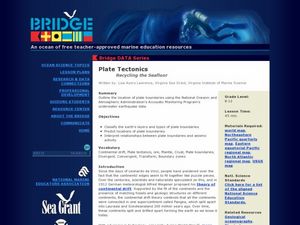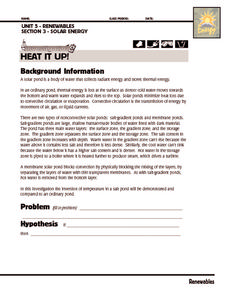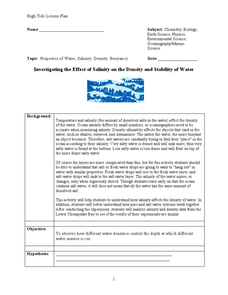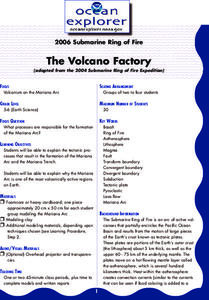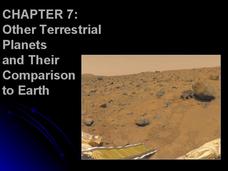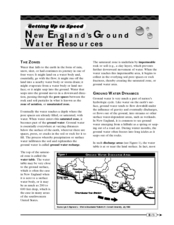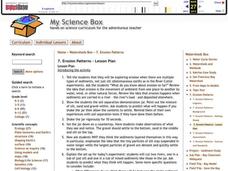Curated OER
Plate Tectonics: Recycling the Seafloor
Students classify earth's layers and plates using Ocean Seismicity data. In this plate tectonics lesson, students outline where the plate boundaries are on the world map. They then compare these predicted boundaries with USGS map of the...
Curated OER
Frogs Frogs Frogs
Students view a disk on the continental movement and analyze the given data on fossils, rock types and climate zones. In this geology lesson students draw a diagram of the earths layers, take a quiz complete a PowerPoint presentation.
Curated OER
Fossil Formation
Students discuss fossils. In this science lesson, students simulate fossils within Earth's layers by using gummy fish and bread.
Howard Hughes Medical Institute
The Day the Mesozoic Died
While this is not the traditional, step-by-step lesson plan, it is chock-full of material that you can easily incorporate into your earth history unit. Its main purpose is to serve as a guide to using a three-part film, The Day the...
K12 Reader
Rainforest Ecosystems
Rainforests are the topic of this brief reading passage. Learners can find out all about the different layers of the rainforest as well as the types of creatures that live there. After reading, they respond to five questions about the text.
Curated OER
Ozone Hole - Changes in the Stratosphere
Halting the depletion of the hole in the ozone layer has been one of humanity's happy recoveries from previous damage done to the environment. Meteorology masters muse the Montreal Protocol and examine data on changes in the ozone....
Curated OER
Plate Tectonics: Sixth Grade Lesson Plans and Activities
Here is a set of pre-lab, lab, and post-lab lesson plans on plate tectonics. After completing the previous labs on volcanoes and earthquakes, sixth graders use the gained knowledge to explore plate boundaries and the movement of...
Texas State Energy Conservation Office
Investigation: Heat it Up!
This demonstration of solar ponds can be used in an earth, environmental, or physical science setting. Lab groups set up a solar pond and model how it is able, due to a salt concentration gradient, to maintain heat for future use.
US Environmental Protection Agency
Building an Model Aquifer
With almost half of Americans relying on groundwater supplies, it is more important than ever to protect aquifers from possible contaminants. Working in small groups, young environmentalists explore this problem as they create an aquifer...
American Museum of Natural History
What is Marine Biology?
A marine environment covers the majority of the earth but is arguably the least understood. Teach young scientists about the characteristics of oceans and ocean species using an interactive online lesson. The in-person or remote learning...
Curated OER
Plate Tectonics: Kindergarten Lesson Plans and Activities
This unit focuses primarily on plate tectonics and plate boundaries surrounding continents. It contains pre- and post-lab sections that walk young geologists through plate movements in order to visualize what's going on inside Earth.
California Academy of Science
Carbon Cycle Role Play
Anytime you make concepts clear with role playing or hands-on experience, it's a win for the whole class. Ping-Pong balls are used to represent carbon in a carbon cycle role-play activity. In small groups, children first discuss what...
Curated OER
Investigating the Effect of Salinity on the Density and Stability of Water
Water with varying amounts of dissolved salt are dyed and then used to compare densities. The objective is to discover the effect of salinity, and therefore density, on ocean water on the stability of the ocean. Many branches of science...
Curated OER
How Coal Was Formed
Learners consider four diagrams of the Earth's crust, and decide which diagram best fits with the four descriptions on the worksheet. A simple, yet effective teaching tool.
Curated OER
The Coastal Ocean: Estuaries and Continental Shelves
Amazing high-quality satellite imagery, photos, informational graphs, and detailed diagrams comprise this presentation on the movement of estuaries and the continental shelf. Data used as an example is from The Chesapeake Bay and because...
NOAA
The Incredible Carbon Journey: Play the Carbon Journey Game
Class members explore the carbon cycle in the final installment of the 10-part Discover Your Changing World series. They play a simulation game where they walk through the steps carbon takes as it cycles through the different layers...
Ocean Explorer
The Volcano Factory
The tectonic processes that have resulted in the formation of the Marianas Arc, and the Marianas Trench are explored. Groups of pupils access websites that give them a wealth of information about these formations. Each group must prepare...
Curated OER
A Model of Three Faults - Part One
Students construct a fault model using the Fault Model Sheet imbedded in this plan. They create a 3 dimensional model of the Earth, and use dashed lines to illustrate where the fault lies. A discussion of faults follows the completion of...
Columbus City Schools
Diversity of Living Things
Here's a topic classes can really dig—the fossil record. Use the well-organized and thoughtful road map to take eighth graders back in time to unearth the answer. Learn how our climate has changed, and how organisms have...
Curated OER
Volcanoes: Sixth Grade Lesson Plans and Activities
Bring a set of pre-lab, lab, and post-lab lesson plans on volcanoes to your earth science unit. Sixth graders explore the three types of volcanoes found on Earth, plot the specific locations of these volcanoes on a map, and...
Glynn County School System
Terrestrial Planets
Mercury, Venus, Earth, and Mars are collectively known as the terrestrial planets. Although part of the same group, each planet has its own set of characteristics. Scholars explore the characteristics that make the planets unique and...
PHET
CME Plotting
Young scientists build on their previous knowledge and apply it to coronal mass ejections. By plotting the path of two different coronal mass ejections, they develop an understanding of why most don't collide with Earth.
Environmental Protection Agency (EPA)
New England's Ground Water Resources
Learn all about where ground water is stored, how it moves, and how it is accessed in a detailed and thorough 10-page reading. Whether supplementing reading for an existing environmental or earth science course or providing background...
Curated OER
Erosion Patterns
Students explore erosion when there are multiple types of sediments. They view a soil separation demonstration jar before and after agitation to determine how and why the layers settled. In addition, they conduct experiments with a river...
